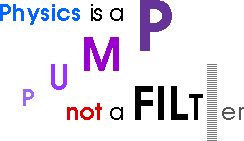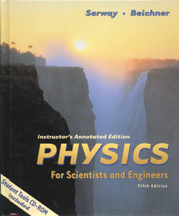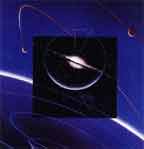

Room 1114
581-6346
(Prof Brandt's) Lecture: 0900 MWF, room 2153
Lecture: 1000 MWF, room 2153
(My) lab: 0900 T , room 2409
(My) lab: 1515 T , room 2409
(Prof Brandt's) lab: 1500 W , room 2409
Course calendar (including homework assignments)
PHYsics 1351 is the lecture component and PHYsics 1352 is the laboratory component of this first semester course of a three-semester sequence of calculus-based Introductory Physics. For convenience, PHY 1351 and PHY 1352 will, no doubt, often be referred to as "PHY 1350". You must take both the lecture and lab components! If you drop one you will also be dropped from the other. If you fail one component, so you must re-take that component, you must also re-take the other component of the course.
PHYsics 1350 is the first semester of a three-semester sequence of calculus-based Introductory Physics for students majoring in Physics, Chemistry, and Engineering.
PHY 1350 covers Mechanics: motion, both its description (kinematics) and its cause (dynamics), conservation ideas (energy, momentum, and angular momentum), simple harmonic motion, circular motion, and gravity.
PHY 1360 covers Thermodynamics and Electricity and Magnetism. For most mortal students Electricity and Magnetism will prove the most difficult area in the three semesters. Be aware of that and be prepared for it. You have all kinds of experience with Mechanics but very little experience with E&M.
PHY 1370 covers Waves, Optics, and Modern Physics -- Special Relativity, Quantum Mechanics, atomic and nuclear Physics.
PHYsics 1150 and 1160 cover most of these topics at a more rapid pace with consequent less detail and are algebra-based. PHYsics 1050G and 3050G are quick one-semester overviews of Physics. PHYsics 1051G is a quick one-semester overview of Modern Physics.
In the past Physics was known as "Natural Philosophy". I like the implication of that name; Physics is understanding the natural world around us. Physics involves understanding, not memorizing. Spend your time and effort understanding the ideas and the equations will (almost) take care of themselves. Equations are tools or summaries; they are not ends in themselves.
 |
|
HELP! What in the world am I doing in this course? |
|
General Physics (or Engineering Physics) has a reputation for being a "tough course". Why are you in this particular Physics course? This course requires a fair amount of work, concentration, and mathematical background. What are you planning on doing ten years from now? This course is designed for -- and required of -- the designers of the future! Don't tell your history-major roommate, but scientists and engineers are le creme de le creme! Think of a recent interview with some physician who is pioneering a new alternative to heart surgery. She (or he) is using new devices -- devices that were conceived, designed, and built by scientists and engineers -- people just like you! Think of CAT-scans and MRIs. Physicians -- MDs -- use these new and wonderful tools in remarkable situations. Who designed CAT-scans? Who designed MRIs? Scientists and engineers -- just like you! Think of the new SONY Playstation 2 (PS2). Who built it? People in the careers you want to get into. Think of the Rockin' Roller Coaster at the Disney-MGM Studios. Who built it? Disney Imagineers like some of you want to become. Think of the new flat-panel LCD or plasma displays you are beginning to see for computers and televisions. Who built them? Scientists and engineers -- just like you want to become. You have wonderful, exciting futures ahead of you. You're not planning on sitting on the sidelines, just using things that others have provided you. You're planning on inventing the future yourselves. BRAVO! That's great. That requires a deeper understanding. That requires more details. This course in General Physics is the foundation for that kind of a career. |
|
|
|
|
||
T E X T
 |
You should already have Serway and Beichner's fine textbook, Physics for Scientists and Engineers. Please read the material before it is discussed in class. Saving a textbook as a last resort before an exam or before looking at homework problems makes the course more difficult than it needs to be. Make life easy for yourself; read the textbook. Take a few class notes over this familiar material. Work all the assigned problems -- and a few more. Then relax for the exams will be easy. |
L A B O R A T O R I E S (PHY 1352)
Physics labs are quite different from, say, chemistry labs. While care must be taken in making measurements, finding the value of an unknown to a tenth of a percent is not the main reason for doing a Physics lab. The labs are designed to go along with the lecture and the textbook and to demonstrate principles discussed there. Again, understanding is the key idea.
|
Think of why you are doing various steps in the
lab. Never -- never, never, never! -- just blindly follow the procedure.
Understand why you are doing something or what it will tell
you.
|
 |
|
Homework is vital in Physics!!!! I can not stress that too much. Physics is like SCUBA diving -- it requires participation and practice and learning from your own errors. You may be able to understand the Civil War by listening to lectures. But you can not successfully learn to SCUBA dive only by listening to lectures -- you have to get wet! Physics, too, requires that you "get wet", that you get your hands messy in the mire of homework problems. There simply is no other way to learn Physics. Most of the exams will not be strikingly different from the homework. Diligence with the homework will make the exams easy but ignoring the homework will make the exams impossible! Struggling with and learning from doing the homework is vital! You must do the homework -- just to survive!
Homework is like that. You have to do the homework yourself! A common and reasonable "rule of thumb" for any three-semester-hour course is that you must put in about nine hours a week reading the material and thinking about and working on and answering the homework. It is probably not possible to survive (or pass) this course with a smaller time committment. Homework is vital! You simply can not learn Physics without it. However, I am not collecting and grading your homework. This requires great maturity and responsibility on your part! Homework solutions will be posted on the internet. Before you look at the solutions on the web, work the problems yourself! That is very important. |


|
On the Course Calendar page I have listed the assigned homework problems. In addition, there are a few "Conceptual Questions" assigned for each chapter and a few calculational problems from Serway's fourth edition. Those are all listed on the web homework solutions pages. If you click on the problem assignment on the Course Calendar page you will be taken to the corresponding homework solutions page where you will find the rest of the homework assignment. Your homework assignment is more than just the calculational problems that appear on the Course Calendar page .
G R A D E S
Your grade for this course will be determined by the following:
Hour exams-- 3/4 @ 100 pts 300 pts
Final exam (comprehensive, of course) 200
Miscellaneous 40
Total 640 pts
Miscellaneous:
10 pts each for --
eMail autobiograpy (8/24)
photograph (8/24)
bulletin board bio (8/27)
participation in "The Convincer" (10/15)
There will be four hour exam in PHY 1351 but I will discard the lowest score and retain only your three highest scores. However, there are no make-up exams in this course! None!
In my opinion, there are two objective methods of grading.

One can determine grades strictly by a predetermined number
(e. g., 100 - 91, A
90 - 81, B
80 - 71, C
70 - 61, D etc.)
One can also determine grades strictly "on a curve" (e. g., 15% will get A's; 20%, B's; 30%, C's; 20%, D's; and 15%, F's).
The first method requires that the instructor be able to write perfect exams. The second requires a perfect distribution of students. I have never found either condition met.
Therefore, my grading "system" is some mixture of the two. You may consider the above grading scale a sort of "guaranteed minimum". An 82 will be a B. But a 79--or even a 78--may also be a B.

That is, I will not raise letter grade requirements but I do reserve the right to lower them.
ADDITIONAL RESOURCES
|
THE MECHANICAL UNIVERSE (TMU) video tapes are available in the Self-Study Materials Center (SSMC) in the library in McAfee. I would like to show several TMU tapes in class. Other pressures of the course may/will prevent this. These are excellent tapes made a few years ago at CalTech and include short historical sketches, wonderful computer animation, and scenes that may be difficult or impossible to duplicate in the classroom. While they were made for a PBS audience they also include extensive examples of calculus. I strongly recommend that you view some (or all!) of them. |
 |
Homework solutions, class lecture notes, and class hand-outs will be posted on the Internet or the World Wide Web. We will discuss the Internet the first week of class. You can link to the PHY 1350 material from my home page. We will talk about internet addresses (URLs) early in this course.
COPYING someone else's ideas or creative talents is called plagiarism. Presidential candidates have had careers ruined because of plagiarism. Pulitzer prizes have been taken back because of plagiarism. Students have been expelled because of plagiarism. Unauthorized copying of computer programs is also called theft. We have licenses for all the software you will encounter in this course. University policy is that you should not illegally copy computer software. I expect you to abide by that.